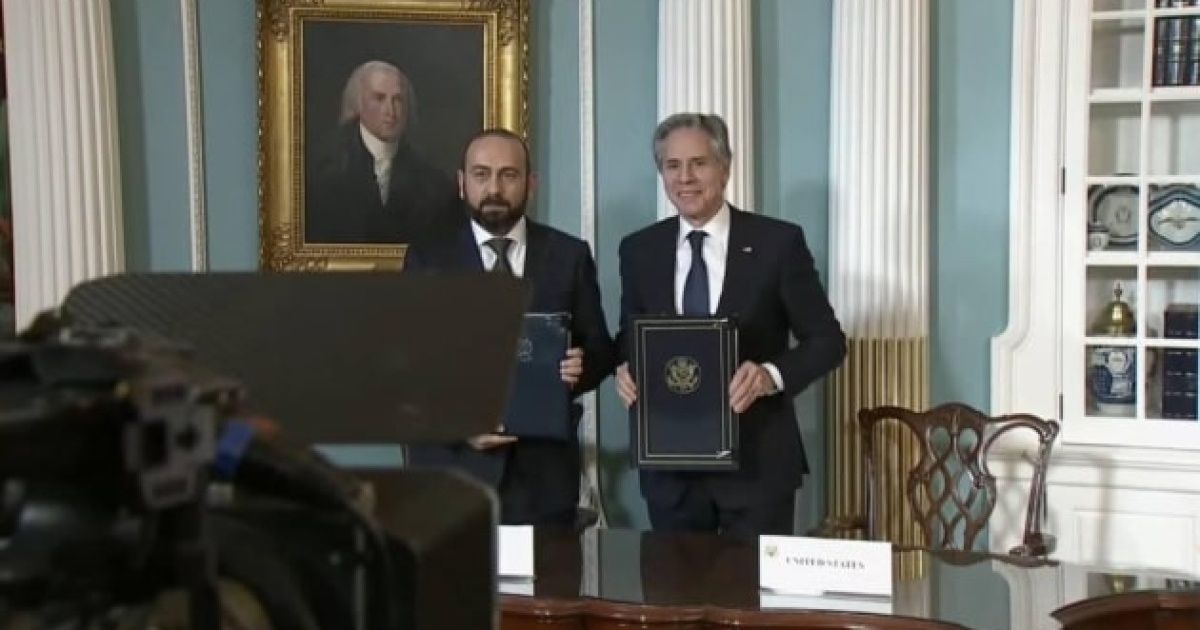Armenia signs bold partnership charter as failed Biden administration plays its last gamble

The signing of the Strategic Partnership Charter between Armenia and the United States on January 14 in Washington is a pivotal step in deepening bilateral relations. With Armenian Foreign Minister Ararat Mirzoyan and US Secretary of State Antony Blinken as signatories, this agreement signifies a new chapter in US-Armenian cooperation. This Charter signifies a deepening of bilateral relations, emphasizing shared values such as democracy, sovereignty, and territorial integrity. It outlines cooperation across various sectors, including diplomacy, economy, energy, technology, education, defense, and security.
This move aligns with the Pashinyan administration's post-Trump strategy of anchoring Armenia firmly within the US sphere of influence. Building on growing support from the Biden administration, the partnership is a calculated effort to secure Armenia’s geopolitical standing amidst shifting alliances in the South Caucasus. It is indeed without any doubt, a notable achievement for Armenia.
The U.S.-Armenia Strategic Partnership Charter is not an isolated event but part of a broader geopolitical recalibration. The date of the agreement's signing is particularly significant. I would like to remind you that in just two days, on January 17, Russia and Iran are set to sign a comprehensive strategic partnership agreement consisting of 47 articles that cover various areas of cooperation. Both of the events are taking place just a few days before Trump's inauguration, which adds to its importance. The major players in the region, especially Iran and Russia, will undoubtedly assert their strong concerns about this process. Meanwhile, the Biden administration is strategically making critical policy decisions before Trump’s inauguration, clearly aiming to put him in a challenging position.
However, this partnership raises other critical questions for Azerbaijan. As the US strengthens ties with Armenia, will it continue an Armenian-centric policy at the expense of relations with Baku? Azerbaijan has long urged Washington to adopt a more balanced approach, warning that prioritizing Armenian interests risks perpetuating regional tensions. President Ilham Aliyev has consistently advocated for equitable relations, emphasizing Azerbaijan’s strategic importance as an energy corridor and regional stabilizer. One pressing issue is whether the U.S.'s deepening ties with Armenia will influence its approach toward Azerbaijan. Baku has already expressed concerns about the perceived imbalance in U.S. policy, particularly regarding the unresolved issues stemming from Armenia's occupation of Azerbaijani territories in the past.
For Armenia, aligning with the US could come at a cost. Speculation abounds about whether Pashinyan might sacrifice Armenia’s membership in the Russia-led CSTO to further solidify US support. Such a move would be a significant geopolitical gamble, potentially inviting Russian economic and political retaliation while straining Armenia’s security guarantees.
The implications of this partnership extend beyond the South Caucasus. A new US strategy could emerge in the CSTO region, with Armenia and Kazakhstan as potential focal points. Moreover, the agreement may signal a shift in US posture towards Iran, given Armenia’s shared border with the Islamic Republic.
For Baku, the document’s details remain critical. Will it contain provisions that directly affect Azerbaijan’s interests? And how will the Trump administration—or a future Biden continuation—navigate these complex dynamics? Answers to these questions will likely shape regional politics in the coming months, especially as the US formulates its broader foreign policy strategies concerning Ukraine, the Middle East, and its relations with the EU.
The strategic partnership agreement with the United States is likely to become another loud but ultimately inconsequential document that serves a purely declarative purpose. This is expected to happen following the announcement of Armenia's "freezing" of its membership in the CSTO and the initiation of the process to join the European Union. The real implications of this move will lead to a significant deterioration in relations with Russia, which is responsible for nearly 40% of Armenia's trade turnover.
While Armenia celebrates this achievement, Azerbaijan remains watchful. The trials of Armenian citizens accused of crimes against Azerbaijan persist, and the absence of external mediators reflects Baku’s resolve to ensure accountability. Note for further notice: It has now been over four years since the Second Garabagh War, yet the Biden administration has failed to secure a peace deal between Baku and Yerevan, as well as with the Pashinyan administration. This situation demands urgent attention and decisive action.
For now, the signing of the U.S.-Armenia Strategic Partnership Charter marks a significant shift in regional dynamics, one that will undoubtedly have far-reaching consequences for all players involved.
Here we are to serve you with news right now. It does not cost much, but worth your attention.
Choose to support open, independent, quality journalism and subscribe on a monthly basis.
By subscribing to our online newspaper, you can have full digital access to all news, analysis, and much more.
You can also follow AzerNEWS on Twitter @AzerNewsAz or Facebook @AzerNewsNewspaper
Thank you!

